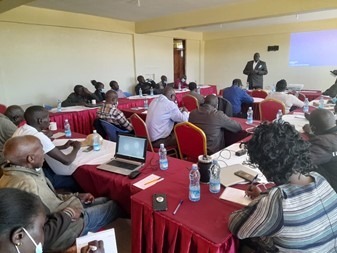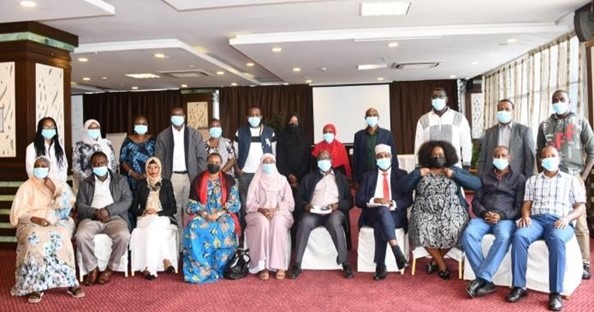
In Northern Kenya, drought, floods, locusts, diseases, and conflict over resources negatively impact the wellbeing of communities. The result is often hunger, loss of income, violence, environmental degradation, and loss of life. To combat this, select county governments are drafting Disaster Risk Management (DRM) policies that will legally entrench response mechanisms into each county’s development plan. Legislated disaster preparedness will improve efficiency, quicken response times, generate trust in government, and protect citizens and the environment.
In the past, competing priorities, inadequate technical capacity, and limited resources have prevented the counties from institutionalizing DRM. Feed the Future Kenya USAID Kuza, an Associate Award under the Feed the Future Kenya Livestock Market Systems Activity, funded by USAID, helped the counties overcome these roadblocks. USAID Kuza’s approach led to the approval of the Lamu County DRM Act, completion of four counties’ draft DRM policies, and introduction of two DRM bills for County Assembly review and public participation.
This policy success attracted cooperation from other implementing partners, including the Agency for Technical Coordination & Development, World Food Programme (WFP), Northern Rangeland Trust (NRT), and United Nations Development Programme (UNDP). These partners have co-funded aspects of the policy development process, participated in the technical writing workshops, and committed resources toward the operationalization of the DRM policies once enacted. USAID Kuza aims to pass DRM acts in five counties: Lamu, Mandera, Marsabit, Wajir, and West Pokot counties.
Assisting Government Officials and Non-State Representatives
In 2020, USAID Kuza met with county governors, secretaries, County Executive Committees, and chief officers from diverse county government departments, including administration and public service management, special programs, disaster risk management and emergency services, finance and economic planning, and trade and cooperatives. In October 2020, USAID Kuza conducted a DRM needs assessment for each of the 10 Frontier Counties Development Council (FCDC) counties in Northern Kenya. The assessment found inadequate DRM technical skills among county staff and weak DRM policy frameworks within the counties. Consequently, USAID Kuza hosted a training for county government officials in the 10 FCDC counties in November 2021.
Based on insights from the assessment and training session, USAID Kuza prioritized five counties to receive immediate DRM policy strengthening support based on existing DRM policy strength, support from Implementing Partners, and desire for DRM assistance: Lamu, Mandera, Marsabit, Wajir, and West Pokot. This was followed by planning meetings with county leadership and a two-day training on strengthening policy framework with working groups. Upon completion, technical writing teams from these working groups—consisting of official and non-state representatives for women, youth, and the private sector— spent four days drafting their DRM policies. Using a capacity-building baseline tool, USAID Kuza will measure the counties’ progress in the areas of policy framework planning, implementation framework, monitoring and evaluation, technical capacity, and resilience planning. During the annual survey period, USAID Kuza will use this tool to compare tangible and intangible county assets.

County Governments Drive Their Own Success
From the beginning, USAID Kuza ensured the support of both County Executive and County Assembly leadership as well as non-state representatives. In the past, bills developed at the technical level remained in limbo because they lacked broad support, especially from county leadership. USAID Kuza’s method centered on collaborative sessions, timely briefings on progress, and training of key staff. USAID Technical teams in each county led their writing sessions, while USAID Kuza consultants assisted. As a result, the bills are the creation of county governments, not of implementing partners.
Fostering Collaboration
USAID Kuza also invited other implementing partners to future meetings and writing sessions. This reduced duplication of efforts, layered interventions, and increased efficiency. USAID Kuza facilitated a multi-stakeholder forum to coordinate efforts among the WFP, NRT, UNDP, and World Vision. Each organization has dedicated time and resources to USAID Kuza’s common DRM agenda in the targeted counties.
What’s Next?
USAID Kuza expects all five counties to table the DRM bills in the County Assembly, obtain approval, and for county governors to assent of the DRM acts by April 2022. With new frameworks in place, businesses and individuals’ confidence in the government to handle disasters will increase, along with economic opportunity. Good DRM policy provides an efficient foundation for planning, coordinating, and layering partners’ efforts; it also acts as a resource mobilization tool. In the future, implementing partners such as the WFP, UNDP, and the Kenya Red Cross plan to commit resources to operationalize priority areas outlined in DRM frameworks.
Learn more about USAID Kuza.
Learn more about ACDI/VOCA’s work in Kenya.








